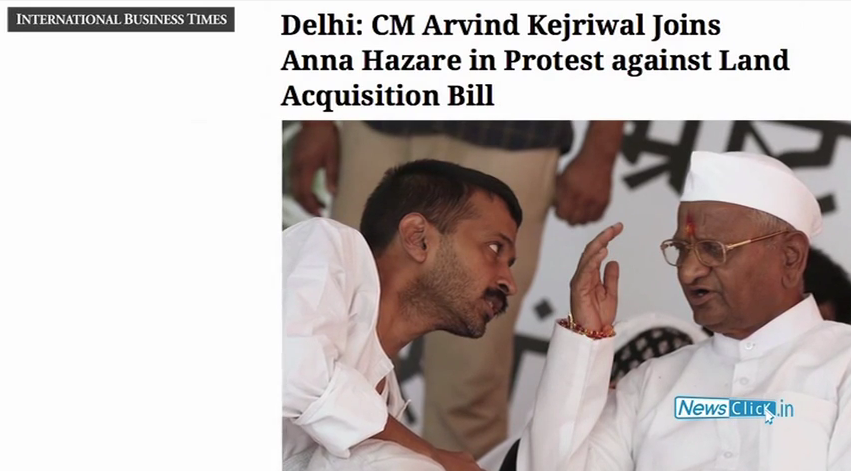Modi Returns to Colonial Land Acquisition Law
Amendment to the Land Acquisition Act that the BJP has introduced in Parliament has been opposed not only by anti-NDA parties but also by its allies. Even RSS affiliated Bhartiya Kisan Sangh openly protested against the Amendment. Newsclick interviewed senior journalist, Paranjoy Guha Thakurta on the issue. Paranjoy strongly criticized the Bill, and said that it is against the rights of the farmers and meant only for the benefits of few corporates, with Gautam Adani benefitting the most. BJP’s defence of the Amendments is an attempt to defend the indefensible – covering an anti-farmer policy in the name of creating employment to help the builder lobby.

Rough Transcription
Pranjal(PR): hello and welcome to newsclick. Today we are going to discuss about the ordinance that the current BJP government is bringing to change the Land Acquisition Act of 2013. To discuss the issue we have with us senior journalist Paranjoy Guha Thakurta. Hello paranjoy, we have seen that in 2013, the same act, the Resettlement and Rehabilitation Act was passed after a discussion within various political groups of which BJP was part and Sumitra Mahajan was leading the committee. So what was the need to change it when the BJP government came to power and what are the major changes that it is proposing in comparison to the act which was passed in 2013.
Paranjoy Guha Thakurta(PGT): the parliamentary committee headed by Mrs Sumitra Mahajan who belongs to the Bhartiya Janta Party, who is the speaker of the Lok Sabha took into account the views of all sections for over 2 years there were discussions wide among different political parties, state government central government and finally there was a consensus that this act needed to be brought in place to replace the 1894 Land Acquisition Act. Now what has surprised a lot of people and many people believe that this is perhaps the most controversial and contentious decision taken by the Narendra Modi government is that the ordinance enacted and amendment to the act which is being sought to be passed is really diluting and some would say even negating the very purpose for which the Right to fair compensation and transparency Land Acquisition Rehabilitation and Resettlement Act called LARR act 2013 was enacted. Now what are these key issues? The government is claiming that the earlier act had made land acquisition especially for industrial purposes extremely complex and cumbersome. Further it said that the need to bring an ordinance by the end i.e 31st December 2014 was necessitated because 13 other acts needed to be amended and this pertains to the rehabilitation and resettlement of the land losers and these acts relate to various sectors like national highways, metro railways, atomic energy projects, defence establishments, electricity projects and so on and so forth but the truth is that it is far-far more complex. What the government is saying is only one part of the story. What the government has done is virtually done away with the difference between what were earlier private sector projects and what were public sector projects and what are called PPP or public private partnerships. Secondly the consent clause, in the case of private sector projects, the act envisages the 80% of those who lose their land should give their consent that has completely sought to be done away with and finally what is arguably one of the most contentious and debatable issues is that it was legally mandatory to have what is called Social Impact Assessment, that if you are taking land from some people then you have to have an assessment of what will be the impact on society that particular provision, that legal provision is being sought to done away with and many of us would argue that this is really going back to the British time that the colonial era act of 1894, the Land Acquisition Act which had given the government the eminent domain rights, that means the government is like all powerful and literally could acquire land from anybody at any price for whatever purpose. So the very purpose of enacting the act of 2013 is being sought to be completely negated and done away with. The changes that have been proposed in the Land Acquisition Act, there is another aspect which has gone virtually unnoticed and that is government through a gazetted notification has amended the rule, it has tweaked the rules pertaining the land use within special economic zones. What can be used for commercial purposes, what can be used for non commercial purposes and the change in rules would benefit a few corporate groups and the biggest beneficiary would be the Adani group and everybody knows that Mr Gautam Adani , who heads the Adani group is particularly close to Prime Minister Narendra Modi.
PR: when you talk about this Social Impact clause and the clause for the consent they also have mentioned 5 sectors where consent and social impact will be removed. So what are these 5 sectors?
PGT: these include you know Special Economic Zones, large irrigation projects like dams, power plants and water ways and it would also include you know various kind, when you say PPP or Public Private Partnership, it could be anything from a tourism to a power project to an educational institution to health care establishment. The basic purpose of having a Social Impact Assessment was that the people who are going to lose their land, a proper evaluation and independent evaluation needs to be done on what are going to be likely benefits and what are going to be the likely losses and those who are going to lose their land they should become partners, they should become stakeholders in the project. Now this was the basic principle behind putting together the 2013 act and the new ordinance which is sought to be made into a law completely does away with this very very important key aspect of the 2013 act but I wonder whether the government will be successful because of the opposition to this particular proposed change in the law.
PR: when we talk about this act, the current government is bringing and when we compare it with 2013 act there we two specific words, resettlement and rehabilitation in it. Now when we talk about the ordinance which the current government is bringing they say that this entire ordinance is pro corporate also and pro farmers also because the compensation that we are paying remains constant, four times the rural areas and two times of the market price in the urban areas. So why is there such a stark opposition of this entire thing when the compensation remains the same, when the package remains the same?
PGT: it is at best a half truth, at worst a downright false suit or a lie and let me explain why. In our country when land is purchased or sold the real market value of that land is never disclosed in the official documents and the official records and when the title deeds are changed why because they deliberately suppressing the true value of land you pay less stamp duty. So this is the standard technique where compared to the market value of the land what is actually shown in the official documents and records may be one-tenth or one-fifth of the real value. A.) you don’t want to pay the stamp duty and the bulk of the transaction taking place is not disclosed, it is in the form of black money . so if you are actually having the price of the land one-tenth or one-fifth its market value, then even if you pay twice its amount or four times its market value you are still at best getting the market value. So that is at best the half truth. Second point I think that needs to be made is what kind of public purpose or public private partnership, you could have a fancy hospital which is meant for the affluent sections of the people, you could have an educational institution which doesn’t cater to the poor or the under privileged, you can have a tourism project or a cold storage project all in the name of public private partnership but do not benefit the ordinary people whose land you are taking away.
PR: There has been ordinance regarding coal mines also. Now ordinance on land acquisition also. So it is clear exploitation of the natural resources of the people which is going to give benefit to the corporate houses. We also know how Ambanis and Adanis have funded the current government. So do you see it as a broader agenda towards the neo liberal economic policies which the current government has been following?
PGT: Pranjal there is no doubt about the fact that the corporate sector has been completely behind the Bhartiya Janta Party in general and Mr. Narendra Modi in particular in the run-up to the elections, so is this payback back time, I wonder; because the changes in the law are clearly aimed at helping the corporate sector, it has helped big business houses the corporate captains of our country. Now where I want to intervene and say is that even if the government wants to do this it is not going to find it very very easy. Mr Jairam Ramesh who was the former minister of Rural development has pointed out that even within his government there was opposition to it from the finance minister. The then finance minister Mr. P. Chidambaram. Though ofcourse Mr. Chidambaram is singing a different tune taking a position which is very different then the position he took internally within the government when he was the finance minister but more importantly it is not just the congress, it is not just the left, it is not just Trinamool congress; the alliance partners of the Bhartiya Janta Party in the NDA, the National Democratic Alliance coalition, they are opposed to it and these include parties like the Lok Jan Shakti Party of Ram Vilas Paswan, it includes the Punjab based Shiromani Akali Dal, it also includes the Maharastra based Shiv Sena.
PR: and then currently Aam Admi Party in Delhi.
PGT: absolutely. The Shiv Sena has even said that it will go out on to the streets and it will have an agitation and it will get farmers to prevent the law from being amended and as you have rightly pointed out large sections of civil society, Anna Hazare, Raj Gopal’s Ekta Manch there are people out on the streets agitating against what are the virtual reversal of a law and you are really going back more than a hundred years to the kind of law prevailed when the colonial rulers of this country had done and one last point and it is very important to note. The reason why the government will not find it easy to amend the law in this corporate friendly, business friendly manner because within the Bhartiya Janta Party and within the larger ideological fraternity called the Sangh Parivar, the various organizations affiliated to the Rashtriya Swayemsevak Sangh. These hindu nationalist groups including the Swadeshi Jagran Manch including the Bharat Kisan Sangh, they are also opposed to the change in the law and that is why I believe that even though the government is very keen to amend the law it is going to face a lot of opposition. I want to make one point in this context. You see, what happened is all of this has been done austensibly because Mr. Jaitley and earlier before him Mr. Chidambaram claims that this new law makes acquisition of law cumbersome, complicated, difficult. Nobody is arguing that you should not be allowed to acquire land including fertile farm land, including multi crop land to set up industrial project or infrastructural project nobody gets the view that this should never be done. The issue is rehabilitation and resettlement or fair compensation, the consultative process, the people whose land you are taking make them partners in your projects. The point to note is that is that Mr. Jaitley saying that the present law makes the whole process very time consuming but that’s not the only reason, there are variety of reasons why these projects get delayed. Let me read out or let me site to you some of the reason findings of the Comptroller and Auditor General when they had found you know that in early December 2014 in that point of time there were few 191 approved Special Economic Zone projects and this involved an area of over 51,000 hectare but out of this amount, and this is over a period of 8 years barely 40% of the land had been acquired and these Special Economic Zones had been made operational. So even when the law had not been amended you are seeing delays in the entire process of land acquisition and establishment of land project. So to now argue you need change law in which there was political consensus in my opinion is not telling the full story.
PR: so when you discuss this CAG report and 40% of the land that has been acquired remains unutilized. So earlier we had a provision that the unutilized land use to go back to the farmers. What happens to that provision and the land remains in the hand of corporate houses. So even if these SEZs companies shut down they are going to make it a real estate property and sell it at higher prices.
PGT: yeah, that is the unfortunate part of the proposed amendment through the law that even if a company fails to set up the project, those projects that are under Special Economic Zones or could be a cold storage or tourism project, even if these projects do not become operational, even if that company goes bankrupt and goes under still retain control of the land and is able to resell that land or there could be a transfer in the ownership of the entity, the corporate entity that owns that land, all of this is making very industry friendly and corporate friendly but what about the people whose land you are acquiring? What about the farmer? What about the person on the street? And it is not just a question of the farmer or the agriculturalists. It is a question of livelihood; it is a question of livelihood of entire families. So I think this will be extremely difficult for the government to go through with the proposed amendments to the law with right to fair compensation and transparency in land acquisition, rehabilitation and resettlement Act of 2013. I have a feeling, if a government wants to push this through everybody knows that the Bhartiya Janta Party doesn’t have a majority in the upper house of the parliament, the Rajya Sabha. It has a majority in the lower house of the parliament, so the only way forward is to have is to have a joint sitting of parliament and do this but if that is the way the government proceeds to amend this law I think it is going to run into a fair amount of opposition we already see a lot of agitation taking place and I think if the government is hell bent on changing the law or the way it is in the ordinance then you are probably going to see more people out on the streets and more social unrest and more agitation.
PR: paranjoy since you have been dealing with economic issues extensively so what do you propose a law or an act which makes it easy for acquiring land which also does not make it problematic for the farmers, which ensures fair compensation. So what is the way ahead for it?
PGT: see, I think a lot of the problems of the black economy, the illegal economy is in the way land and real estate is valued and transacted. A very substantial part of the money that changes hands when the ownership of the land moves from one person to another person or when real estate transactions take place is because you are not disclosing the true market value. The transactions are not in the legal money or white money, a fairly substantial portion of a well over half or a much over half all of it takes place in the form of black money. This is the same government which was talking about bringing back black money that Indians have you know stashed in the Swiss bank accounts. Mr. Modi before the elections had said that if all the money which the Indian have kept abroad illegally be brought back to the country then you know, you would have been able to give 15 lakhs to each poor family. I mean there would be no poverty in this country. You know 30% of your population each family will get 15 lakh rupees but even he realizes that this figure is not a correct figure; that 90% of the black money has been generated in this country within the country and I would say a very substantial percent of the black economy, the illegal economy is the money that has not been accounted for in this country is utilized for transactions in land and real estate. So if you can tackle this problem and make these transaction transparent. If you have a way to take actions against those indulge in these illegal transaction that would go long way in reducing the size and the influence of the black economy of this country.
PR: that’s all the time we have for today. We will be coming back to you on such issues. Thank you paranjoy. Thank you for watching Newsclick
Get the latest reports & analysis with people's perspective on Protests, movements & deep analytical videos, discussions of the current affairs in your Telegram app. Subscribe to NewsClick's Telegram channel & get Real-Time updates on stories, as they get published on our website.
























